Alfa Romeo Tonale vs Hyundai IONIQ 9 – Which one offers the better deal?
Compare performance, boot capacity, efficiency and price at a glance.
Find out which car is the better choice for you – Alfa Romeo Tonale or Hyundai IONIQ 9?
Costs and Efficiency:
Looking at overall running costs, both models reveal some interesting differences in everyday economy.
Alfa Romeo Tonale has a decisively advantage in terms of price – it starts at 35000 £, while the Hyundai IONIQ 9 costs 58700 £. That’s a price difference of around 23743 £.
As for range, the Hyundai IONIQ 9 performs decisively better – achieving up to 620 km, about 558 km more than the Alfa Romeo Tonale.
Engine and Performance:
Power, torque and acceleration are the classic benchmarks for car enthusiasts – and here, some clear differences start to show.
When it comes to engine power, the Hyundai IONIQ 9 has a distinct edge – offering 428 HP compared to 280 HP. That’s roughly 148 HP more horsepower.
In acceleration from 0 to 100 km/h, the Hyundai IONIQ 9 is slightly quicker – completing the sprint in 5.20 s, while the Alfa Romeo Tonale takes 6.20 s. That’s about 1 s faster.
In terms of top speed, the Alfa Romeo Tonale performs minimal better – reaching 212 km/h, while the Hyundai IONIQ 9 tops out at 200 km/h. The difference is around 12 km/h.
There’s also a difference in torque: Hyundai IONIQ 9 pulls significantly stronger with 700 Nm compared to 320 Nm. That’s about 380 Nm difference.
Space and Everyday Use:
Cabin size, boot volume and payload all play a role in everyday practicality. Here, comfort and flexibility make the difference.
Seats: Hyundai IONIQ 9 offers noticeable more seating capacity – 7 vs 5.
In curb weight, Alfa Romeo Tonale is significantly lighter – 1600 kg compared to 2594 kg. The difference is around 994 kg.
In terms of boot space, the Alfa Romeo Tonale offers noticeable more room – 500 L compared to 338 L. That’s a difference of about 162 L.
In maximum load capacity, the Hyundai IONIQ 9 performs clearly perceptible better – up to 2419 L, which is about 869 L more than the Alfa Romeo Tonale.
When it comes to payload, Hyundai IONIQ 9 a bit takes the win – 643 kg compared to 535 kg. That’s a difference of about 108 kg.
Who comes out on top?
Overall, the Hyundai IONIQ 9 shows itself to be is largely superior and secures the title of DriveDuel Champion.
It convinces with the more balanced overall package and proves to be the more versatile choice for everyday use.

Hyundai IONIQ 9
Alfa Romeo Tonale
The Alfa Romeo Tonale embodies the brand's timeless elegance and sporty DNA, captivating drivers with its bold design and dynamic presence on the road. Inside, the Tonale impresses with a perfect blend of luxury and cutting-edge technology, offering a sophisticated driving experience that remains true to the Alfa Romeo spirit. With its agile performance and distinctive character, the Tonale stands out in the competitive SUV market, appealing to those who seek both style and substance.
details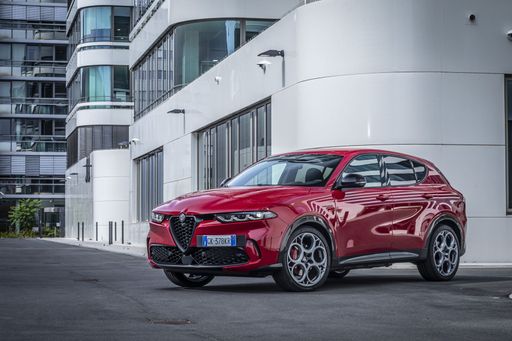 @ Alfa Romeo / Stellantis Media
@ Alfa Romeo / Stellantis Media
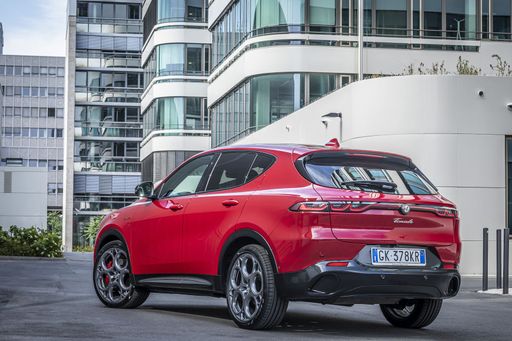 @ Alfa Romeo / Stellantis Media
@ Alfa Romeo / Stellantis Media
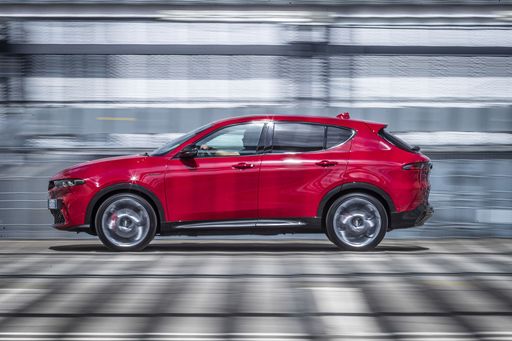 @ Alfa Romeo / Stellantis Media
@ Alfa Romeo / Stellantis Media
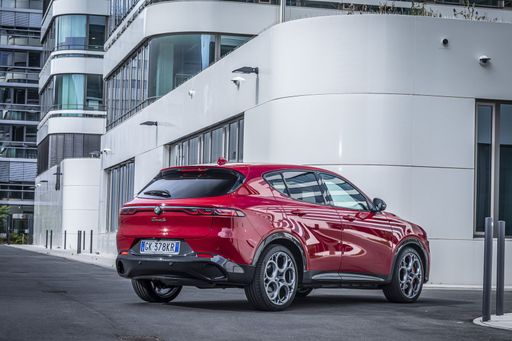 @ Alfa Romeo / Stellantis Media
@ Alfa Romeo / Stellantis Media
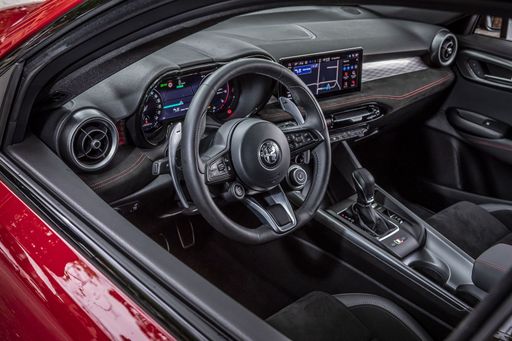 @ Alfa Romeo / Stellantis Media
@ Alfa Romeo / Stellantis Media
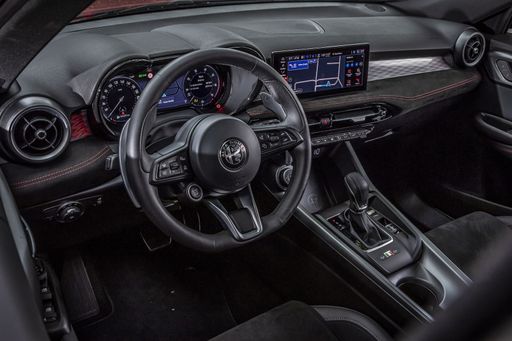 @ Alfa Romeo / Stellantis Media
@ Alfa Romeo / Stellantis Media
Hyundai IONIQ 9
The Hyundai IONIQ 9 is a bold step forward in the automotive world, combining cutting-edge electric technology with a sleek and modern design. This model stands out with its spacious interior and advanced features, ensuring both comfort and convenience for drivers and passengers alike. As Hyundai pushes the envelope in eco-friendly innovation, the IONIQ 9 represents the future of sustainable driving with its impressive range and performance capabilities.
details
 @ Alfa Romeo / Stellantis Media
@ Alfa Romeo / Stellantis Media
|
|
|
|
|
Costs and Consumption |
|
|---|---|
|
Price
35000 - 53200 £
|
Price
58700 - 74400 £
|
|
Consumption L/100km
1.3 - 5.6 L
|
Consumption L/100km
-
|
|
Consumption kWh/100km
-
|
Consumption kWh/100km
19.9 - 20.6 kWh
|
|
Electric Range
62 km
|
Electric Range
600 - 620 km
|
|
Battery Capacity
12 kWh
|
Battery Capacity
110 kWh
|
|
co2
30 - 140 g/km
|
co2
0 g/km
|
|
Fuel tank capacity
42 - 55 L
|
Fuel tank capacity
-
|
Dimensions and Body |
|
|---|---|
|
Body Type
SUV
|
Body Type
SUV
|
|
Seats
5
|
Seats
7
|
|
Doors
5
|
Doors
5
|
|
Curb weight
1600 - 1910 kg
|
Curb weight
2594 - 2689 kg
|
|
Trunk capacity
385 - 500 L
|
Trunk capacity
338 L
|
|
Length
4528 mm
|
Length
5060 mm
|
|
Width
1835 mm
|
Width
1980 mm
|
|
Height
1614 mm
|
Height
1790 mm
|
|
Max trunk capacity
1430 - 1550 L
|
Max trunk capacity
2419 L
|
|
Payload
510 - 535 kg
|
Payload
586 - 643 kg
|
Engine and Performance |
|
|---|---|
|
Engine Type
Plugin Hybrid, Petrol MHEV, Diesel
|
Engine Type
Electric
|
|
Transmission
Automatic
|
Transmission
Automatic
|
|
Transmission Detail
Automatic Gearbox, Dual-Clutch Automatic
|
Transmission Detail
Reduction Gearbox
|
|
Drive Type
All-Wheel Drive, Front-Wheel Drive
|
Drive Type
Rear-Wheel Drive, All-Wheel Drive
|
|
Power HP
130 - 280 HP
|
Power HP
218 - 428 HP
|
|
Acceleration 0-100km/h
6.2 - 10.9 s
|
Acceleration 0-100km/h
5.2 - 9.4 s
|
|
Max Speed
194 - 212 km/h
|
Max Speed
190 - 200 km/h
|
|
Torque
240 - 320 Nm
|
Torque
350 - 700 Nm
|
|
Number of Cylinders
4
|
Number of Cylinders
-
|
|
Power kW
96 - 206 kW
|
Power kW
160 - 315 kW
|
|
Engine capacity
1332 - 1598 cm3
|
Engine capacity
-
|
General |
|
|---|---|
|
Model Year
2024 - 2025
|
Model Year
2025
|
|
CO2 Efficiency Class
B, D, E
|
CO2 Efficiency Class
A
|
|
Brand
Alfa Romeo
|
Brand
Hyundai
|
What drivetrain options does the Alfa Romeo Tonale have?
The Alfa Romeo Tonale is offered with All-Wheel Drive or Front-Wheel Drive.
The prices and data displayed are estimates based on German list prices and may vary by country. This information is not legally binding.
